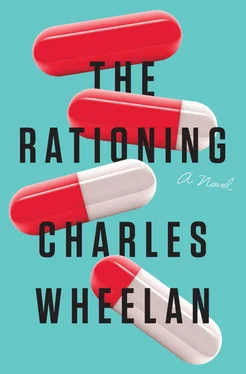The Communications Director had forbidden most of us from speaking to the media: “I don’t even want you to say, ‘No comment.’ That’s too much talking. Just shake your head no. Your lips should not be moving!” For those who would be speaking in public, beginning obviously with the Acting Secretary, he was equally emphatic: “Do not, under any circumstances, say anything specific about who gets Dormigen and who does not. It’s in the briefing document . Refer to the briefing document. If someone asks, ‘My grandfather is a hundred and nine and has emphysema. If he were hit by a bus, would he be eligible for Dormigen?’ you say, ‘The specifics of the plan are in the briefing document.’ Is that clear? I don’t want to see anyone on camera saying anything remotely newsworthy about who gets Dormigen and who does not. They’re going to have to get their sound bites about Grandpa from somewhere else.”
The Communications Director distributed a press release in which he tried to find a kinder, gentler way to point out that most of the people who would be denied Dormigen were going to die soon anyway. He quoted an NIH epidemiologist: “The temporary shortage of Dormigen will have only a modest impact on the two-year mortality rate.” (More accurately, the Communications Director wrote that sentence and then called the NIH epidemiologist to tell him how he would be quoted in the press release.) The release offered several other euphemisms for “they were going to die anyway.” Only NPR figured this out at first, with a story that included the following exchange:
PUBLIC HEALTH EXPERT: “I don’t mean to be insensitive, but most of these people are very old or very ill, so their life expectancy is limited, even if they were to receive Dormigen.”
MORNING EDITION HOST: “So you’re saying they were going to die soon anyway.”
PUBLIC HEALTH EXPERT: “Obviously each one of these cases is difficult—we are denying a lifesaving drug, after all—but yes, that is the essence of what would happen if we were forced to ration the Dormigen as the administration has described.”
MORNING EDITION HOST: “And do you agree with that plan?”
PUBLIC HEALTH EXPERT: “Obviously as a physician I am very uncomfortable denying lifesaving drugs to anyone—”
MORNING EDITION HOST: “Yes, of course, but do you see a better option here?”
PUBLIC HEALTH EXPERT (after an uncomfortably long pause for radio): “Given the horrible circumstances, I would be hard-pressed to come up with a better option. Obviously, I hope we don’t get to that point.”
Our efforts to calm the public kept running smack into the reality of what was happening in the Seattle intensive care unit. Cecelia Dodds was taken off the experimental German medicine because it was harming her kidneys. Doctors put her in an induced coma in a last-ditch effort to help her body fight off the infection. As the Acting Secretary was answering questions in the Capitol, Cecelia Dodds’s daughter gave a short briefing in front of the hospital. “I spoke to my mother this morning,” she began. “There was about half an hour when she was lucid and comfortable and we were able to talk.” Her twin daughters—Cecelia Dodds’s granddaughters—were clinging to her legs, one on each side. “My mother is a strong woman and I have every hope she will pull through. She asked me to thank all of you for your love and support. And she asked me to convey to you…” The daughter paused to compose herself. Her children gripped her legs more tightly. They no longer had the care-free jauntiness of little girls; they either intuited the seriousness of the situation, or someone had explained it to them.
Cecelia Dodds’s daughter continued, “My mother asked me to convey to you, to the nation, that whatever lies ahead in the coming days… that each of us should aspire to be as brave and magnanimous and selfless as we can—as she has been. Let’s aspire to be the best of America…” Her voice choked up and she paused. After a moment: “Love, share, include, and improve. Thank you so much.” This was not exactly the nightmare scenario that the Acting Secretary had feared—that Cecelia Dodds would die while he was explaining to Congress that things would not be so bad, but it was close. As the President began to speak from Air Force One, many media outlets ran a split screen: the President on one side and the large crowd gathered in front of the Seattle hospital on the other.
The Communications Director had drafted a speech for the President that was long on language putting the Outbreak in historical perspective and short on Dormigen rationing details. The President urged the nation to face the challenge with the same vigor and bravery with which Americans had faced other adversities—and so on, and so forth. He reminded the country that his administration was still working around the clock to “beat this virus” (true) and, if that were not successful, to procure additional Dormigen stocks (also true). The President looked tired and drawn, almost grim, as he delivered the eight-minute talk. Anyone watching his speech would assume the Outbreak had taken a heavy toll on him. While this was undoubtedly true, the more immediate explanation (we now know) was that he had just spent two hours speaking to his national security staff, most of whom were sequestered in the situation room back at the White House, to devise a response to the hostage situation in Saudi Arabia. Any kidnapping situation is difficult, but this one—in which parents were being told by the terrorists to swap places with their children—was particularly fraught with ethical and strategic challenges. [30] As most readers will recall, the strange feature of this kidnapping—children being released as their parents turned themselves in—provided an opportunity for U.S. and Saudi Special Forces to sneak a soldier into the compound. The still-unnamed female Army Ranger, who posed as the U.S. Deputy Counsel General, was given only a cursory search by the male kidnappers, as the U.S. officials had anticipated. Six of the ten kidnappers were killed; all but two of the hostages were rescued safely. The fact that a woman had foiled a fundamentalist terrorist group with Stone Age views toward women was, of course, a profound irony.
Near the end of the President’s talk, the Strategist and the Secretary of State had inserted a paragraph (drafted as they stalled before returning the call from the Indian Prime Minister’s office): “The people of the United States are deeply thankful for the contributions of Dormigen that have poured in from around the world. But for that generosity, this crisis would be far more devastating. We have been taught, yet once again, the role the world’s great democracies must play in fighting our collective global challenges.” This was more bait for the Indian Prime Minister—a big, bloody decapitated tuna being towed slowly behind the boat.
India, of course, is the world’s largest democracy. That paragraph had been drafted explicitly to suggest that by shirking its Dormigen duty now, India was putting its claim to global leadership at risk in the future. “Too subtle?” the Strategist had asked as the two of them polished the prose.
“Just right,” the Secretary of State assured him. “Even a hint that India is not one of the ‘world’s great democracies’ will send him into hysterics.” We have no account of what was happening on the India end of this. We do know there was a second phone call from the Prime Minister’s office to the U.S. Embassy (where the U.S. Ambassador was still waiting to return the first call, like a teenage girl playing hard to get). A senior American diplomat fielded this call, and a meeting was fixed at a California Pizza Kitchen in a large mall on the outskirts of Delhi. “This better be important,” the American diplomat warned his Indian counterpart. “Because we’ve got a lot going on right now.”
Читать дальше












